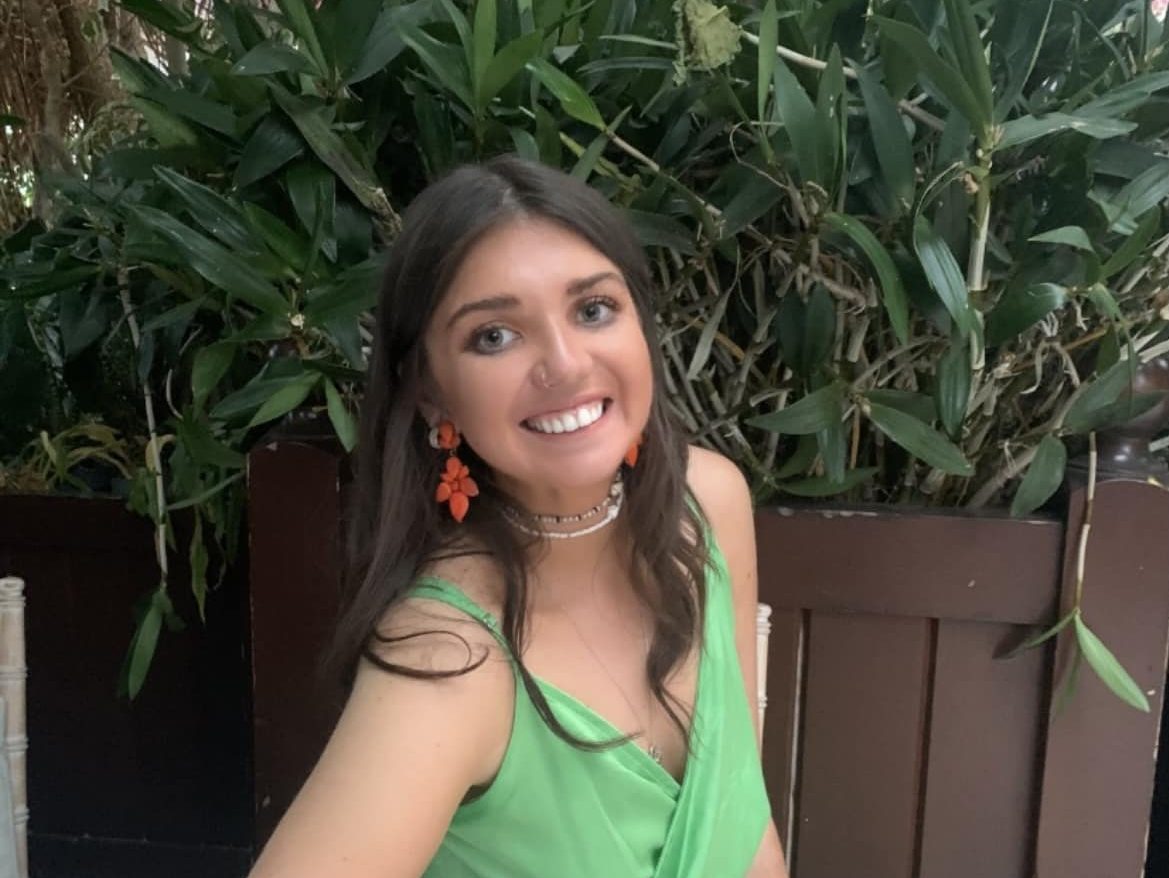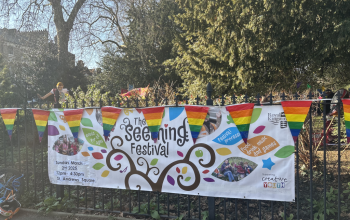I was diagnosed with a brain tumour when I was 17. I was studying for my A-Levels at the time and at an age where I couldn’t imagine something so scary and life-changing could happen to me. I was young. I was healthy. And to me, brain tumours were not common, as I barely heard about them in the media. They were not talked about as much as other cancers like breast cancer or leukaemia. So, if I had to be scared of cancer, it was either of those.
I had never really thought about brain tumours pre-diagnosis, if I am honest, as I did not know anyone who had one. So, if you had asked me back then what sprung to mind when I heard the words “brain tumour”, I would have thought about cancer and people dying. If you had asked me what I thought the symptoms were, I would have guessed headaches. While these things are related to brain tumours, brain tumours are much more complex than that, and it took me to being diagnosed to understand this. This month (March) is Brain Tumour Awareness Month, so why is raising awareness about brain tumours so important?
My Story
For a while, I noticed that my left side was weaker than my right, but I am right-handed, so the weakness did not seem out of the ordinary. I was also, for the first time, experiencing migraines, but I was studying for my A-Levels, and I was stressed, so I did not think anything of it. However, in May 2016, a week before my mock exams that would give me my predicted grades for university, I realised it was time to go to the GP.
I was in a psychology lesson and learning about how the right side of our brains affects the left side of our bodies. My teacher told the class to wiggle our left fingers, but for some reason, I could not. In fact, my fingers were trembling when trying to move them; something my teacher told me should be looked at by a GP. So, I told my parents and booked an appointment with the GP to tell them about my left side; I was not worried that this would be anything too serious, and I thought the migraines were unrelated.
What followed was numerous GP appointments, nerve tests wherein the doctors would knock me in my joints with wooden blocks, and several conversations warning me that, best case scenario, I had a little nerve damage and worst-case scenario, I had multiple sclerosis (MS). The latter terrified me; I was so young.
Fast forward a week, I was almost through my exams when the GP made a referral for me to have an MRI scan, but of course, there was a waiting list of six months. Not only was I terrified at the prospect of having a scan that is commonly related to cancer, but also at the thought that I could have MS and not know for certain for another six months. Fortunately, the universe works in curious ways, and I was called in for an MRI three days later due to a patient cancellation. The words brain tumour had still not been mentioned.
Two days later my mum woke me up in a panic, telling me that the hospital had rang to say that I needed to go in and speak to a consultant urgently. That is when we knew that this was serious.
“We found a brain tumour seated deeply in the right side of your brain, and you’ll have to be referred for surgery immediately,” the consultant told us.
And just like that, within a matter of moments, my life turned upside down. It was benign at least, but it was pure luck that I had got in for a scan that day or I would not have survived.
Less than a week later, I was booked in for surgery at Alder Hey Children’s Hospital at 8 am on a Thursday. This was supposed to be a one-time surgery that would solve my problems so I could go back to life as normal. However, my surgical team found a blood clot on the opposite side of my brain to where the tumour was during surgery. So, they had to stop the surgery and perform another one on the other side, which my surgeon said was as aggressive as being hit by a car. This meant that they did not remove the whole tumour and that I would have to have another surgery.
I could not walk or talk properly, and my left side was worse than before; the weakness had to my leg and face too. Thus, I had to teach myself to walk and talk again, and I needed help showering, going to the toilet, brushing my hair, and getting myself dressed.
I also noticed that I could not see anything within my peripheral vision. Thus, I had a visual field test, which found that I now had no peripheral vision, meaning that I will never be able to drive. This occurred during my surgery due to my tumour being so close to my occipital lobe and should have been considered pre-surgery.
My second surgery went much better. However, my surgeon realised that removing the whole tumour would result in full paralysis and blindness, so he left a small part of the tumour.
I am now seven years post-diagnosis, and the residual tumour has not grown again. I am still having routine MRIs and hope to end these in three years’ time. However, my body has never been the same since, I have physical, visual, and mental disabilities now.
Adapting to this change in myself was challenging, but I became a young ambassador for the Brain Tumour Charity a few months after my second operation, and this really helped me. As a young ambassador, I felt, for the first time since my diagnosis, like I was not alone as I met lots of other people who had had brain tumours, and I used my story to raise money for more research into less invasive treatments and offer advice to others preparing for surgery.
While I have my own struggles caused by my surgery, meeting other brain tumour survivors has made me realise how lucky I am – that I was still able to continue my A-Levels just two weeks after my last operation and can live independently, as I have met people whose treatment was so invasive, they may never be able to live independently.
Why Brain Tumour Awareness Month is so important
Brain tumours are the biggest cancer killer in people under 40, yet only two percent of cancer research funding goes into brain tumours.
Last year, Eastenders presented a brain tumour storyline through the character of Lola Pearce, who was diagnosed with a glioblastoma which eventually killed her. According to Dr Karen Noble, director of research, policy and innovation at Brain Tumour Research, “Glioblastoma (GBM) is one of more than 100 types of brain tumour”.
This was the first time, post-diagnosis, that I saw an authentic representation of life living with a brain tumour in the media, and it felt so important to me.
I mentioned earlier that I rarely heard about brain tumours in the media post-diagnosis, but since my diagnosis, I feel like I hear about them all the time. This could suggest that brain tumour awareness has been more overt in the past seven years, but it could also highlight a more important matter – that because I nor anyone I knew was not affected by one, I would turn a blind eye or ignore any talk or news about brain tumours. This, I can imagine, is common among many people, but it also reveals how important it is to raise awareness about brain tumours because by not knowing about the signs and symptoms, you may, like me, leave it until it is too late to seek medical help and thus be left with a lifetime of difficulties or even worse.
Following my loss of peripheral vision, I found out that my tumour could have been spotted during an eye test, but because I had always had pretty good vision, I had not had an eye test since I was a kid. This is why raising awareness about brain tumours is so important. Like me, many people will not go for eye tests unless they feel they see a significant change in their vision, and so, with the symptoms of many brain tumours occurring slowly, they may go undiagnosed for years.
Changes in vision can be a symptom of brain tumours, yet not many people know about this, so should they experience minor changes, they may be likely to ignore it. Thus, if the government were to encourage regular eye tests as they do for dental appointments and smear tests, delayed diagnoses for brain tumours could decrease.
As you have read from my story so far, treatments for brain tumours can cause life-changing damage to patients. This is also why raising awareness about brain tumours in order to increase funding for research is so important. In 2018, as part of my ambassadorship for the Brain Tumour Charity, I attended an APG in Parliament on the importance of increased funding for brain tumour research.
At the APG, I was enlightened by a woman who worked at the University College London Hospital. She explained that, while finding a cure for brain tumours is important, this alone is not enough. Due to the damage caused by treatments, she encouraged that brain tumour researchers should also seek to find less invasive treatments to reduce the risk of damage. This can only be done with more funding for brain tumour research, so we should keep raising awareness about brain tumours.
Hannah Kinsell, 24, Southeast London, also sees the importance of raising awareness about brain tumours. Kinsell was diagnosed with a grade four glioma in 2014 at the age of 15 after being hospitalised for a brain haemorrhage. The haemorrhage, her doctors found, was caused by a bleed in her brain tumour.
Kinsell has had radiotherapy and two types of chemotherapy and has been in remission since 2016.
She said: “Raising awareness is super important to me – I was a young ambassador and then a Young Ambassador Mentor for the brain tumour charity. It was wonderful because I met people like me, who understood what I was going through, and I’ve made friends for life. I haven’t met anyone yet who was diagnosed like I was (via brain haemorrhage), but there are a lot of similarities between me and my young ambassador group.
“We tried to raise these issues, such as going to parliament to talk about the deadly cancer gap. There’s an issue in that people don’t know enough about brain tumours, as this causes patients to become isolated.”
If you or anyone you know has been affected by a brain tumour diagnosis, it is important to know that you are not alone and that there is support out there, such as the following organisations:
Macmillan Support Line: 0808 808 00 00
Brain Tumour Support helpline: 01454 422 701. This line is available from Monday to Friday, 9 am – 5 pm. The organisation also offers a range of other support services, which can be found here.
Surrey Family and Child Support: 020 8974 5931. This service is part of Momentum and is based in Kingston.
Editor and reporter for the Kingston Courier





